E-Pluribus | July 15, 2024
Lowering the heat; returning true tolerance to universities; and how disinformation increasingly can lead to jail.
A round-up of the latest and best musings on the rise of illiberalism in the public discourse:
Luke Hallam: How to Walk Back from the Brink
As political violence in America is discussed in the wake of the attempt on Donald Trump’s life, it’s worth noting that our political violence pales in comparison to some other countries (“From September to May, 34 candidates or aspiring candidates have been assassinated [in Mexico.]”) This is not to say it should be ignored, however. At Persuasion, Luke Hallam offers some thoughts on turning down the heat.
This is a deeply perilous moment for America. It has been decades since anybody made this serious an attempt on the life of an American president, and much longer since anybody did so with political tensions running as high as they are right now.
[. . .]
Everyone who comments on public affairs must refrain from making incendiary statements. In many ways, it’s already too late: the right (some portions of the right) is blaming the mainstream media, as if its coverage of Trump was an incitement to violence, while the left (some portions of the left) celebrated the attack, making phrases like “one job” and “how could you miss” go viral. Given the state of the discourse, this kind of irresponsibility was to be expected; but we must, in the hours and days to come, firmly push back against it.
Each of us must refrain from unfounded speculation about the presumptive shooter, or his motives, until the police have done their work, or verified facts emerge. In some ways, the ubiquity of digital technology worked to our advantage: the attack was broadcast live, we saw what happened, we saw that Trump survived, that he was injured, that there were gunshots. It’s a small blessing, and should constrain some of the inevitable conspiracy theorizing that will follow this event. Competing narratives will certainly emerge from this crime—indeed, the myth-making is already underway. Until we get a clear picture, it will take a heroic collective effort to prevent cynical speculation from taking over the narrative.
The 2024 election must proceed as planned. There’s a cliché about the peaceful transfer of power, about the importance of the normal functioning of America’s democratic process. These norms have been strained in recent years. This moment could turn out to be worse. It is the kind of situation that can set off an escalation to mass violence. We know what it takes to conduct a presidential election: how to keep it secure, how to manage crowds and protect the integrity of the electoral process. The work of making sure those things happen begins now—failure to prepare for the coming storm could be the greatest mistake America’s collective institutions ever made.
Read it all here.
Gregory Conti: Can Universities Tolerate Disagreement Again?
One of the criticism of modern higher education is that, despite publicly pushing “diversity” as a strength, many institutions encourage conformity instead. At City Journal, Gregory Conti evaluates the new push for a return to institutional neutrality and potential benefits such a stance will provide both the school and its students.
For the past decade or so, universities have been eager to put themselves at the center of American political consciousness, often in barely concealed alignment with “the resistance” to a certain president. But they have apparently decided that some measure of course correction is in order. Recent months have seen several universities, including rich and famous ones like Harvard and Stanford, announce versions of an institutional neutrality policy: statements on public controversies in the name of the institution are now verboten. This is a positive development, one that I expect more universities will imitate, at least de facto if not de jure.
Yet, even as institutional neutrality gains broader acceptance, it continues to have opponents on the right and the left. While these critics are often insightful, the truth is that any effort to reform academic life will require recovering this principle, best articulated in the University of Chicago’s 1967 Kalven Report. Eloquent justifications of the policy already exist, but it is worth drawing out a few points not often discussed elsewhere.
[. . .]
Political statements are unbecoming of a university (setting aside religious institutions committed to confessional identities). A university is supposed to be a place of reasoned debate, furnishing of evidence, and careful consideration of potential counterarguments. But the institutional pronouncement on a heated controversy almost never fits these criteria. This is no surprise: a dean’s or president’s office is not a place for writing substantial essays or doing original research. Rapid-fire messaging, emotional appeals, sloganeering—these are all acceptable in democratic political competition. But they are not the sort of thing that universities are lavishly subsidized and legally privileged to produce. Further, they send the message that moralized bluster is the way their own students and employees should relate to politics. I—and, if the polling indicating universities’ declining standing is to be believed, much of the country, as well—would prefer a university that stands for rationality and reserve in public life, rather than contributing to the agitated enthusiasm of which our politics is already too full.
[. . .]
That universities have had to beat a hasty retreat to the policy of abstention from institutional statements in the face of jeering from their conservative opponents happened only because they lost the habit of handling open disagreement in the first place. The explosion of ill-considered politicization in the 2010s and early 2020s, and the universities’ related difficulties in the aftermath of the October 7 attacks, stem from a common problem: a loss of an understanding of itself as a community in which deep divides were present. It had become the universities’ practice to regard those who were outspoken in favor of “right-wing” views as unfortunate oddities at best and deserving of sanction at worst.
[. . .]
No institution, of course, is neutral in the sense that it presupposes that what it does is worth doing. In the case of a university, that means that the search for knowledge in organized disciplines according to established canons of evidence accessible across lines of religion, race, and creed is worth pursuing at the individual level and worth subsidizing at the social level. The comparative value of this enterprise does not exist as a self-evidently objective fact about the world; there are plenty of other good things one could do with one’s life, and plenty of other goals to which the nation could devote its scarce resources. As a result, no university can be noncommittal about the value of truth, nor any department within it about the value of the subjects it teaches and researches; and institutions of higher education must be populated by those who can make an eloquent case about the worthwhileness of these endeavors.
But none of the preceding resolves the question: “How much ought these institutions to be weighing in on the hot-button issues of the day?” That the university should be prepared to make a full-throated defense of the pursuits of knowledge and teaching has nothing to do with whether it should make pronouncements on war and peace, or on the proper rate for the capital gains tax. Recognizing, as they claim to do, the need for a civil society constituted by various institutions dedicated to specific purposes, conservatives should avoid getting sucked up in abstract argumentation about the impossibility of neutrality. And given that conservatives tend to stress the fragility of institutions, they above all should be sensitive to the problems of political position-taking from university spokesmen, given how vital it is, if institutions are to fulfill their essential functions satisfactorily, to avoid mission creep. In sum, the university is not neutral on such values as academic freedom, research integrity, and the worth of its disciplines. But it is for that very reason that it should not insist in its corporate voice that it has the right answers to the great moral or policy questions of the age.
Read it all.
Natalie Alkiviadou: Prison for Fake News
Being jailed for simply speaking is most people’s idea of a dystopian nightmare, and increasingly in Europe, that nightmare is becoming reality. Writing (in English) at the German website Verfassungsblog, Natalie Alkiviadou looks at new legislation in Cyprus that, if adopted, could result in prison time for spreading “fake news.” But, Alkiviadou argues, “fake news” is too often in the eye of the beholder, and if that beholder is the government, the opportunities for abuse outweigh any potential benefits.
In Cyprus, a new legislative proposal introduces a prison sentence of up to five years on those spreading fake news. I argue that criminally punishing fake news is absolutely horrifying for free speech, for media pluralism, and for democracy. Criminalizing fake news is, to say the least, highly problematic for a number of reasons. It has a “chilling effect” and it causes a self-censorship by media and civil society organizations, activists and average citizens. Moreover, the concept of fake news is highly ambiguous and contested which reduces the certainty and clarity of its regulation. Furthermore, criminalizing fake speech is, in fact, counterproductive as it is not reducing the content but “often draws more attention to it.” While criminalizing fake news is normatively wrong, it is especially problematic in countries like Cyprus, which are already marred by a tainted media landscape.
[. . .]
Despite the fact that European and international institutions condemn the criminalization of fake news, Cyprus is not the only State of the European Union to take this route. In 2021, Greece amended its Criminal Code to prohibit fake news. Human Rights Watch urged the Greek Government to immediately revoke these provisions noting that this law could be used to “punish media professionals, civil society, and anybody who criticizes or takes issue with government policies, creating a chilling effect on free speech and media freedom.” This piece of legislation has a lower (but still high) prison sentence than its Cypriot counterpart, specifically up to three years. Similarly as Cyprus, Greece has problems with the open media with a score of 57.15 and a place of 107 out of 180 according to the 2024 Reporters without Borders Index. Additionally, Malta also criminalizes fake news with a prison sentence from one to three months, or between three and six months if the offence results in disturbance. In the European Union, the only country with a fake news prison sentence equivalent to the Cypriot proposal is Orban’s Hungary which has been systematically experiencing a deterioration of the rule of law. Hungary is ranked 72 out of 180 and it has received a score of 67 out of 180 in the RSF Index. In all said countries, the situation of the freedom of press is ranked as “problematic”.
By no means do I mean to downplay the effects of disinformation which is undoubtedly a “systemic challenge for democracies”. While disinformation is not a new phenomenon, technological advances allowing for cheap disruption in the post-truth era of the global online ecosystem of information pose challenges to societies at large. But alas! This does not mean we should be criminalising it.
[. . .]
[C]ensorship must be avoided. Scholars such as Barata and Calvet-Bademunt have argued that disinformation must be tackled by “non-repressive mechanisms such as media ethics, communication policies, reinforcement of public service media, or promoting media pluralism.” Adopting legal provisions to prohibit disinformation/fake news and to criminalize it with the penalty, therefore, has no place in a liberal democracy. Also, the European Court of Human Rights has noted the incompatibility of such laws with freedom of expression and the European Convention on Human Rights. Moreover, there is evidence that laws such as the one proposed in Cyprus can have chilling effects on freedom of expression and media freedom. Silencing speakers can set the scene for conspiracists to turn into martyrs, while not actually making “false ideas” disappear. The Cypriot authorities must also bear in mind that the sheer propensity of the central forum through which the majority of speech is disseminated (the online world) is large and hard to regulate. In brief, sending someone to jail for fake news could open a can of worms.
Read the whole thing.
Around Twitter (X)
Via Damon Linker and Conor Friedersdorf, a reminder to be careful with “the media”:
A seven month investigation at USC has cleared a professor for comments about Hamas. Seven months…
And finally, Ben Dreyfuss on “do unto others as they do to you” politics:






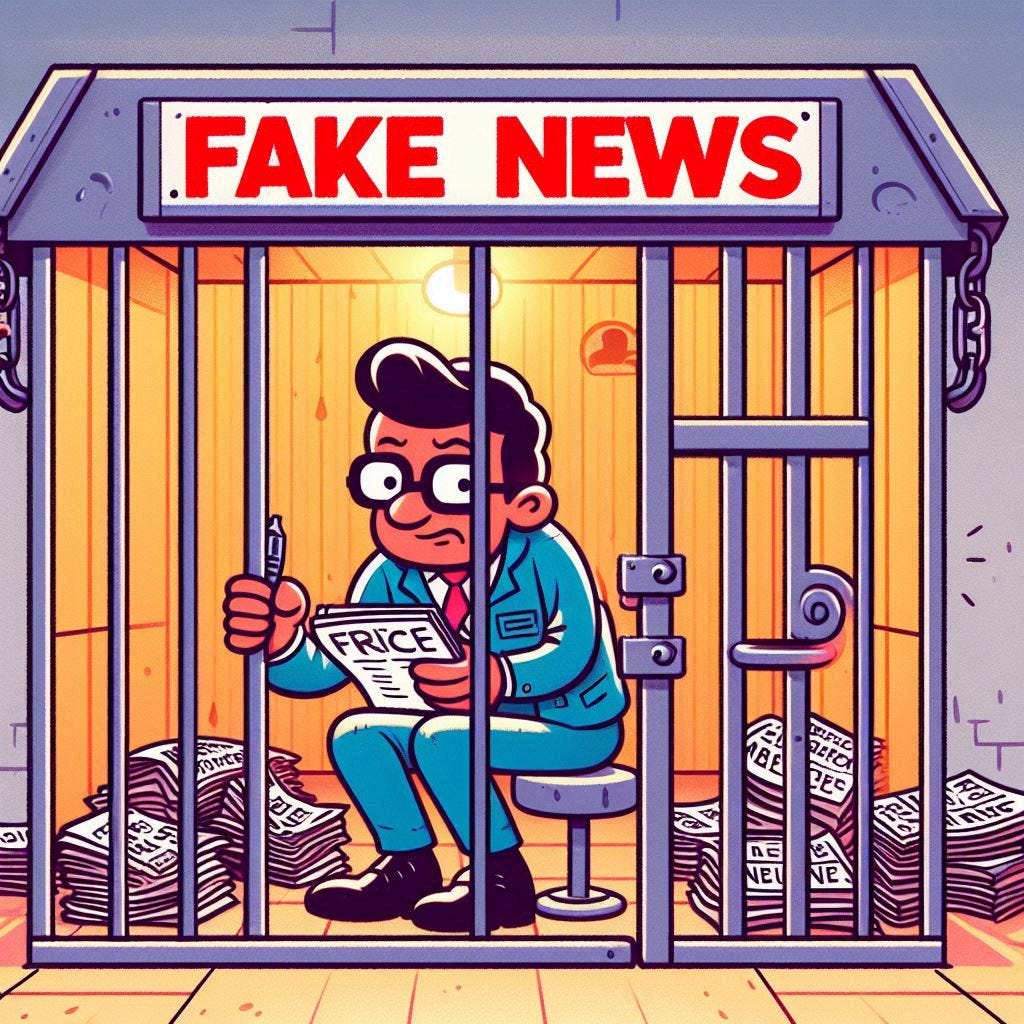
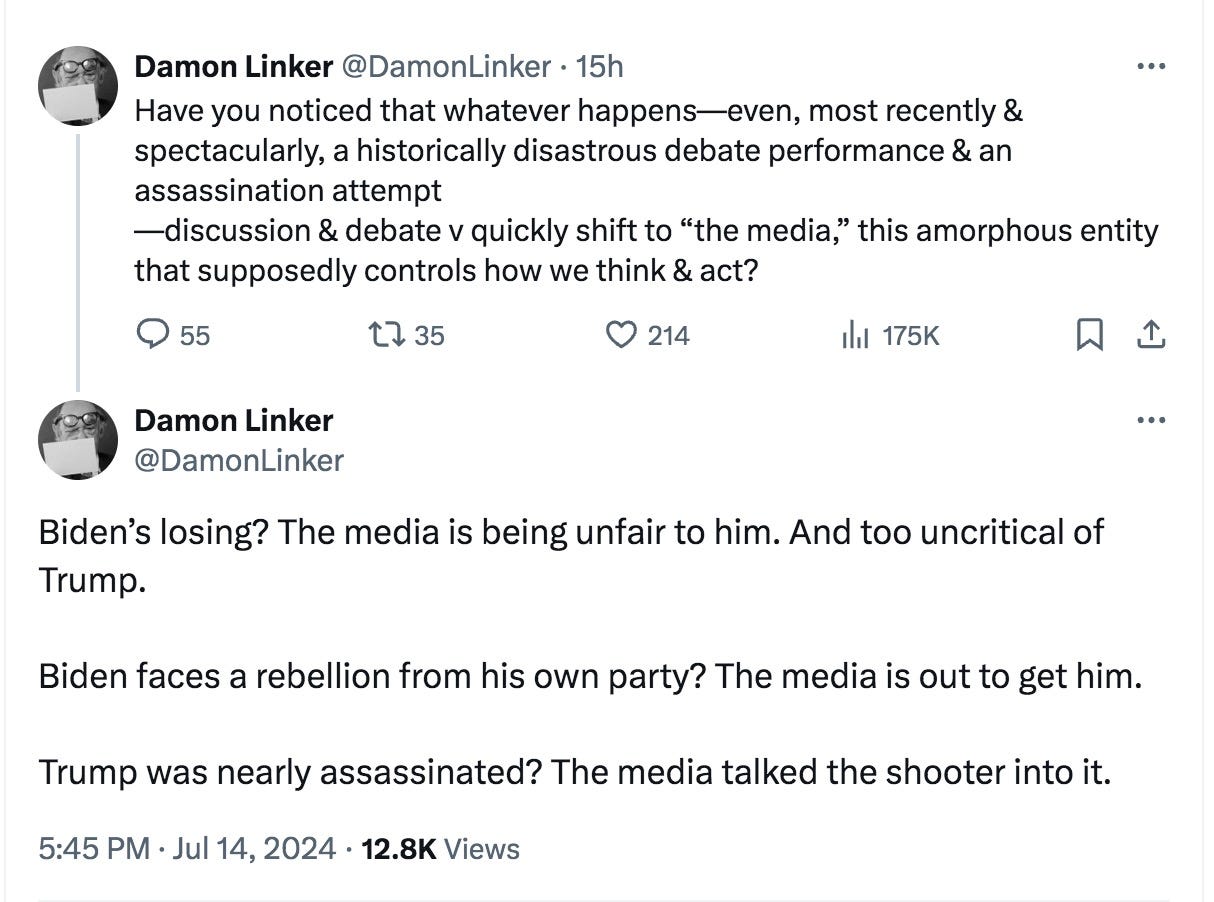
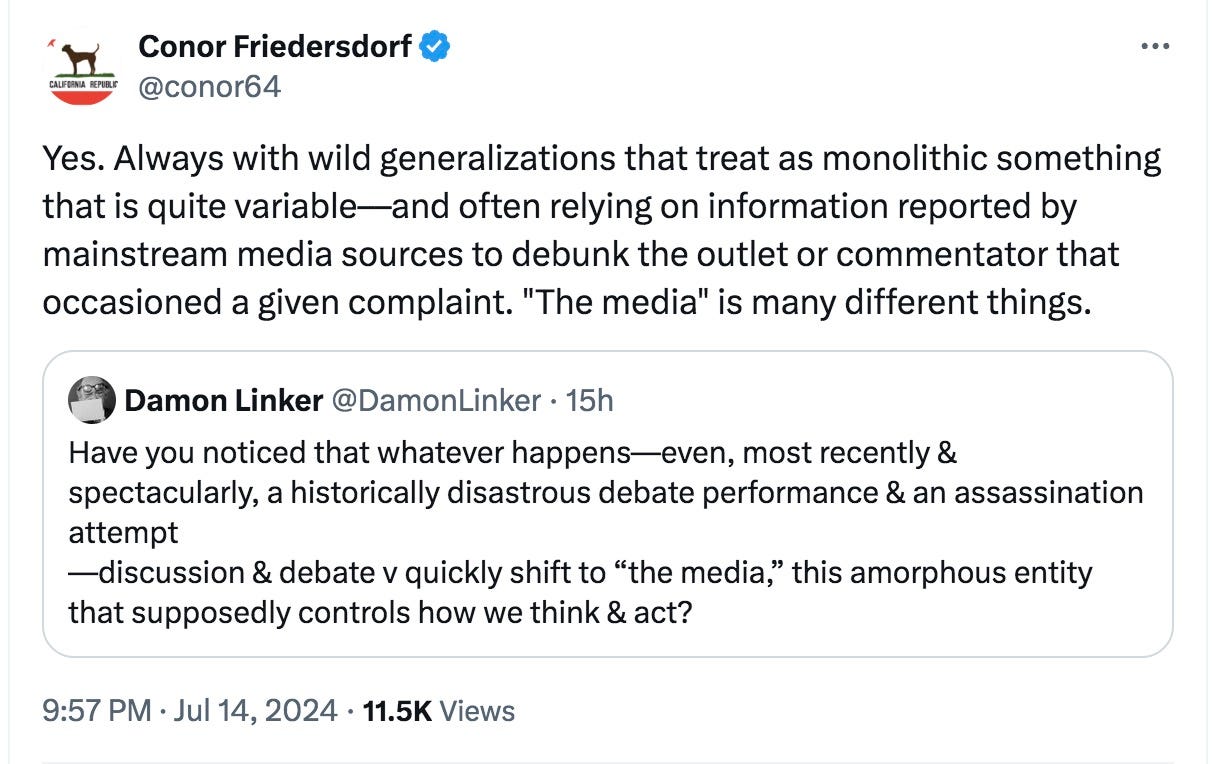
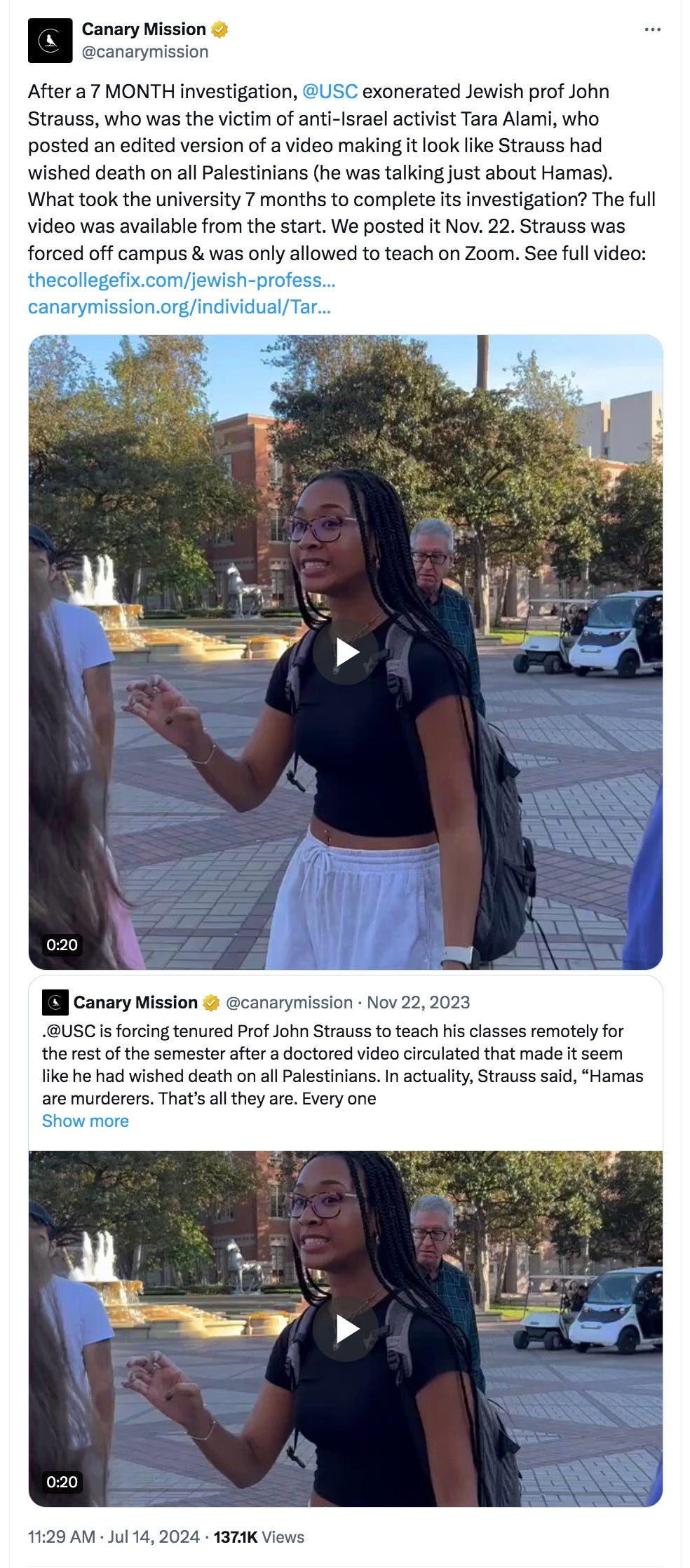
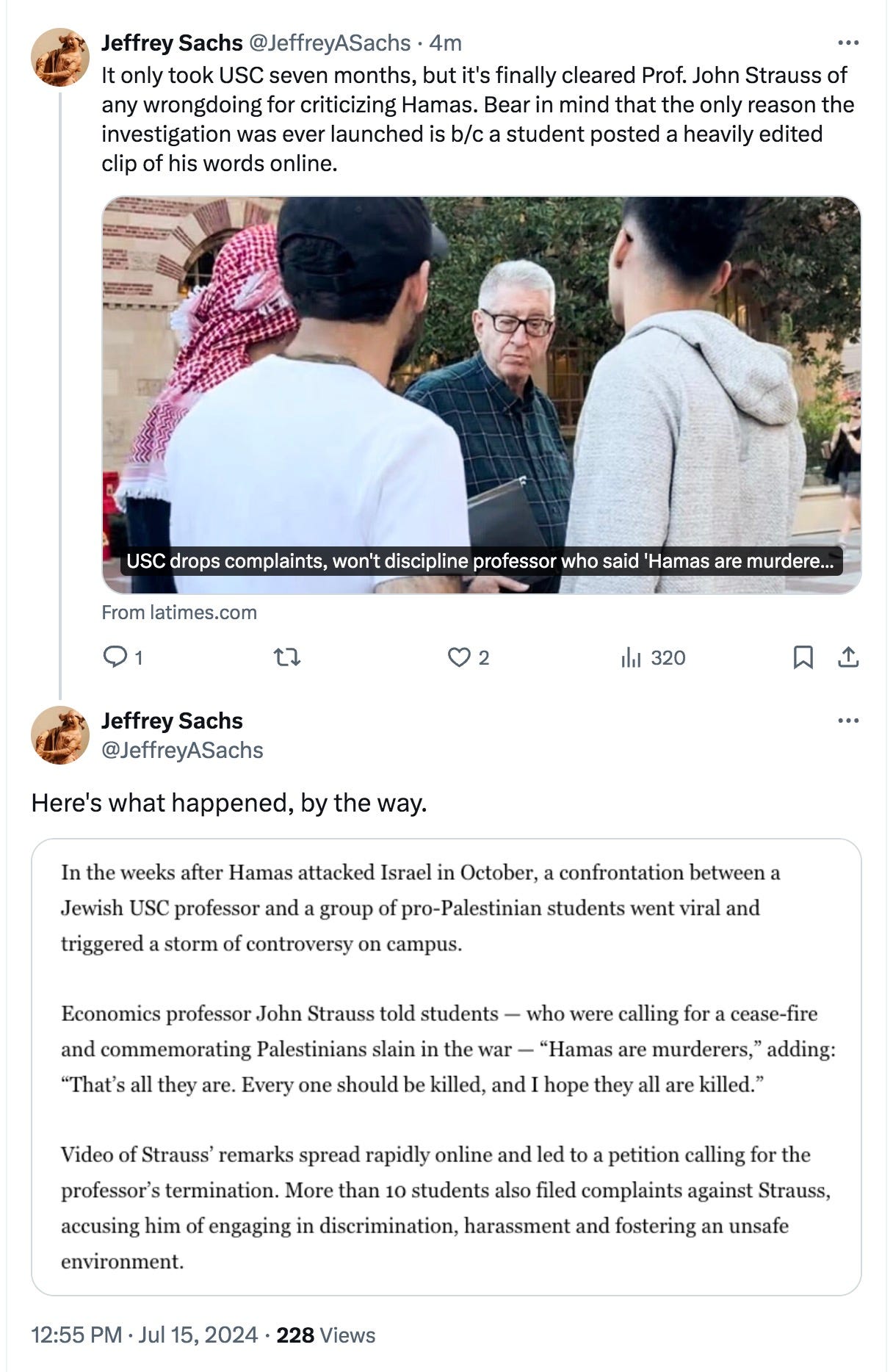
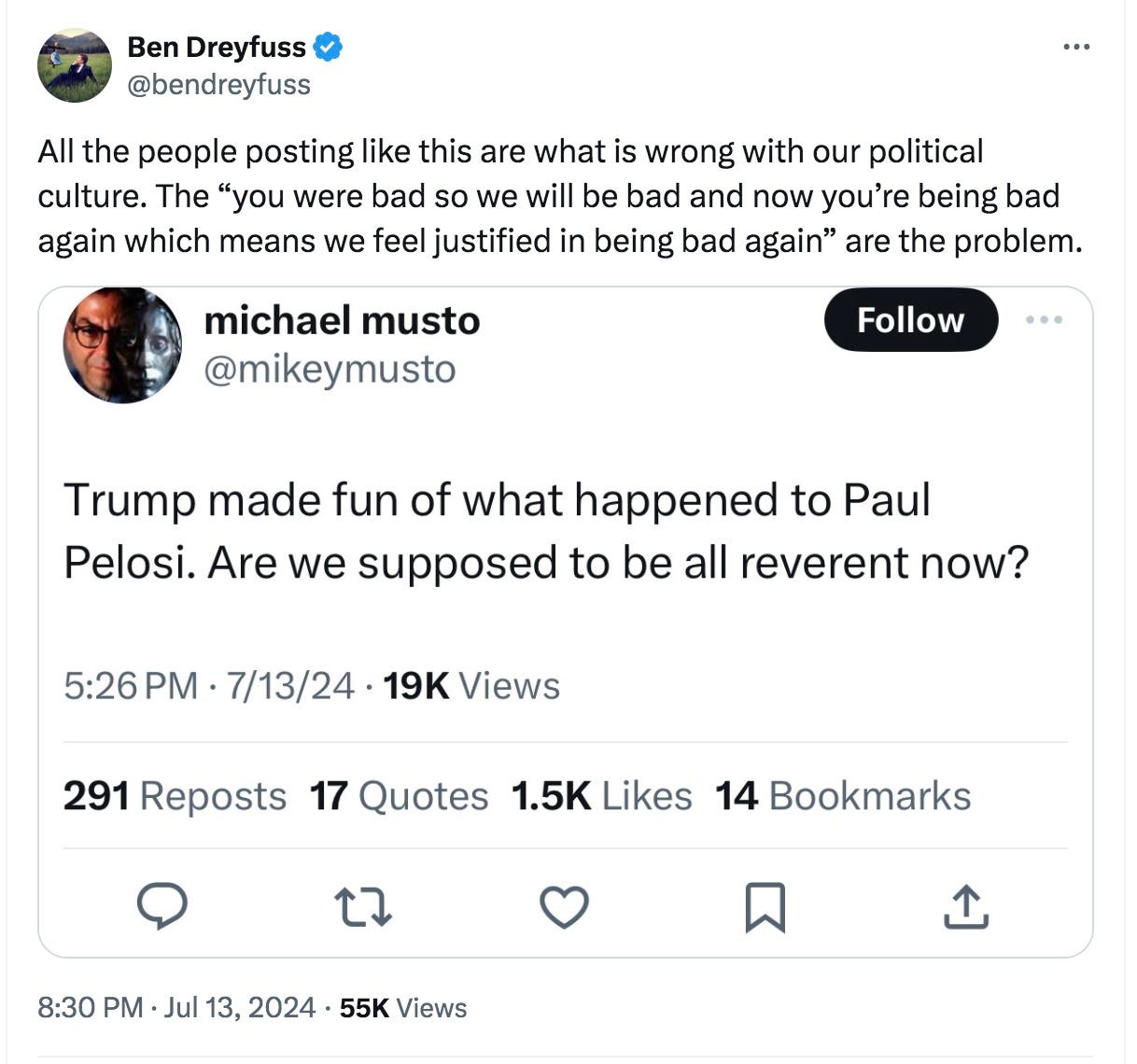
English-speaking universities have become corporates in their financing, marketing and culture. More managers, fewer scholars. Less real service to the local community and more travel budgets for executives. Cow-towing to culture warriors. These institutions have nothing to do with free thinking and speech any more.